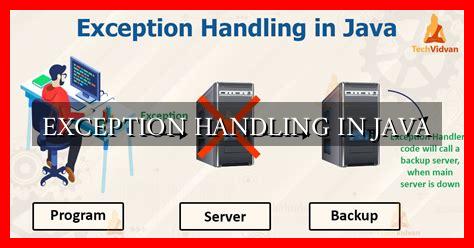-
Table of Contents
Exception Handling in Java
Exception handling is a crucial aspect of programming in Java. It allows developers to anticipate and handle errors that may occur during the execution of a program. By effectively managing exceptions, developers can ensure that their applications run smoothly and provide a better user experience. In this article, we will explore the concept of exception handling in Java, its importance, and best practices for implementing it.
What is an Exception?
An exception is an event that disrupts the normal flow of a program’s execution. It can occur due to various reasons, such as invalid input, network issues, or hardware failures.
. When an exception occurs, the program must handle it appropriately to prevent crashes and unexpected behavior.
Types of Exceptions in Java
In Java, exceptions are divided into two categories: checked exceptions and unchecked exceptions. Checked exceptions are checked at compile time, while unchecked exceptions are not checked at compile time.
- Checked Exceptions: These exceptions must be caught or declared in the method signature using the
throwskeyword. Examples of checked exceptions includeIOExceptionandSQLException. - Unchecked Exceptions: These exceptions do not need to be caught or declared. Examples of unchecked exceptions include
NullPointerExceptionandArrayIndexOutOfBoundsException.
Handling Exceptions in Java
To handle exceptions in Java, developers use try-catch blocks. The try block contains the code that may throw an exception, while the catch block handles the exception if it occurs. Additionally, developers can use the finally block to execute code that should always run, regardless of whether an exception occurs.
Here is an example of exception handling in Java:
“`java
try {
// Code that may throw an exception
int result = 10 / 0;
} catch (ArithmeticException e) {
// Handle the exception
System.out.println(“An arithmetic exception occurred: ” + e.getMessage());
} finally {
// Clean up resources
System.out.println(“Finally block executed”);
}
“`
Best Practices for Exception Handling
When handling exceptions in Java, it is essential to follow best practices to ensure the reliability and maintainability of the code. Some best practices include:
- Catch specific exceptions: Catching specific exceptions allows developers to handle different types of errors appropriately.
- Log exceptions: Logging exceptions helps in debugging and troubleshooting issues in the code.
- Throw exceptions when necessary: Only throw exceptions when it is necessary for the caller to handle them.
Conclusion
Exception handling is a critical aspect of Java programming that allows developers to manage errors effectively and ensure the robustness of their applications. By following best practices and using try-catch blocks, developers can handle exceptions gracefully and provide a better user experience. Understanding the different types of exceptions and how to handle them is essential for writing reliable and maintainable code in Java.
For more information on exception handling in Java, you can refer to the official Java documentation.





